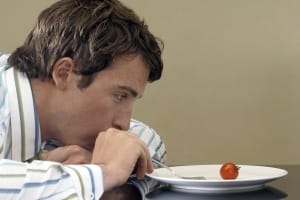You’ve been diagnosed with an eating disorder — now what? You know that your thoughts, feelings and attitudes toward food and eating are not healthful, but how to change? The good news is that you got the diagnosis; it means that you are on the right track to healing. Along with professional help for your disorder, you can also find ways to cope. Changing is never easy, but with good coping skills you can learn to change your behaviors and live a healthy and happy life with food as your friend.
Eating Disorders and Food
When you have an eating disorder you obsess over what you eat, how much you eat, when you eat, and everything else about eating and food. The truth is that anorexia, bulimia, and binge eating aren’t really about food. You developed an eating disorder because you started to use food and eating as coping mechanisms for other issues. Eating disorders are psychological. Food and eating become ways to cope with painful feelings and to get a sense of control over your life. When you learn different coping mechanisms, you can stop using food in that way. The first step is to go to therapy or counseling with a professional who will help you sort through the emotions that led you to obsess over food in the first place. Then you can begin to put new coping strategies to work in your everyday life.
Coping With Food
Food and eating have become a central part of your life. Now is the time to create a new, healthy relationship with food. Education is a great way to cope with eating. Work with a nutritionist to learn healthy eating habits and to plan menus, meals and snacks. Create a routine for eating and stick with it. Avoid strict rules, such as no desserts or sugar, and allow yourself small indulgences. And most importantly, focus on healthy eating and get rid of the idea of dieting altogether.
Get a Support System
Having the support of others will go a long way in helping you cope with your disorder. Make sure at least one person, a friend or family member, knows that you are struggling with an eating disorder. Going it alone is too difficult for anyone. It also helps to have others around you who understand your daily challenges. Talk to your therapist about support groups that you can join.
Get Distracted
Another great way to cope with your eating disorder is to distract yourself from the urges you feel to binge, purge, diet, or generally obsess over food and your weight. Take up exercise, yoga, or meditation to relieve stress and tension. When you feel well physically and mentally, you will be stronger when it comes to resisting your obsessive urges. Take up new hobbies and activities to give your mind something else to do. Get involved in an activity you always thought about doing, like dance lessons, volunteering, or art classes. When you feel like binging or you find yourself thinking too much about eating and weight, start working on your new hobby. Replace your bad habits with new, positive ones. Recovering from and coping with an eating disorder are never easy, but you can find a way. With professional help, a strong support system, caring loved ones and good, healthy coping mechanisms you will get through this and you will learn to have a positive relationship with food and a renewed sense of self-esteem.

